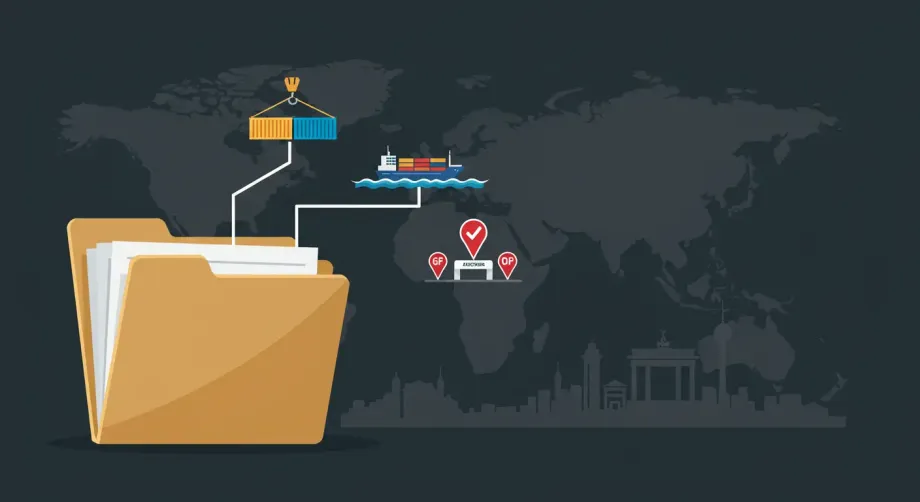
Incoterms® 2020 explained for SMEs: EXW, FOB, CIF, DDP (simple and practical)
I advise companies on cross-border sales and logistics. Below I explain how Incoterms® 2020 shift risk and costs, which terms make sense for SMEs, and how to avoid the common traps.
Why this matters
Incoterms share two jobs: who pays for which leg of transport and when risk moves from seller to buyer. If you pick the wrong term, you pay for steps you did not expect or carry risk for too long. The fix is simple: choose the right rule, write it cleanly, and match your contract and insurance.
Essentials in one minute
- Risk ≠ cost. Risk passes at a point defined by the term. Costs follow the split in the rule. They are not always the same moment.
- Incoterms do not govern payment, title, or breach. Use your sales contract for those.
- Always add the named place/port and “Incoterms® 2020”. Example: “CIF Santos, Incoterms® 2020”.
- Two families: any mode (EXW, FCA, CPT, CIP, DAP, DPU, DDP) and maritime/river only (FAS, FOB, CFR, CIF).
The seven terms most SMEs actually use
EXW — Ex Works (seller’s premises)
Risk: passes when goods are placed at the seller’s disposal. Good for: domestic pick-ups by local buyers. Trap: poor choice for exports; buyer may struggle to clear export formalities. I rarely advise EXW for exports.
FCA — Free Carrier (named place)
Risk: passes when the goods are handed to the carrier at the named place. Good for: most container shipments. Tip: name the exact handover point (e.g., “FCA Hamburg Depot, Incoterms® 2020”).
FOB — Free On Board (named port of shipment) — vessel only
Risk: passes when goods are on board the vessel. Good for: bulk or non-container loads. Trap: do not use FOB for containers; use FCA instead.
CFR — Cost and Freight (named port of destination) — vessel only
Risk: passes when goods are on board at port of shipment. Seller pays freight to destination port. Insurance: buyer’s job (unless you choose CIF).
CIF — Cost, Insurance and Freight (named port of destination) — vessel only
Like CFR but with seller’s insurance. Minimum cover for the buyer’s benefit. Trap: seller still bears risk only to on-board, not to the destination port. Many mix this up.
DAP — Delivered At Place (named place of destination)
Risk: passes on arrival, ready for unloading. Good for: door-to-door when the buyer clears import. Tip: name the exact site (e.g., “DAP Buyer Warehouse, Lyon”).
DDP — Delivered Duty Paid (named place of destination)
Seller handles everything, including import clearance and duties. Trap: taxes, registrations, and indirect tax rules can bite. Only use DDP where you fully control import compliance (or have a reliable local partner).
Choosing a term: a simple map
- Containers? Prefer FCA (seller hands to the first carrier) or CPT/CIP (seller also pays the main leg, with CIP requiring higher insurance).
- Bulk or non-container, vessel loading? FOB/CFR/CIF.
- Buyer wants a “landed” price but will handle import? DAP.
- You will handle import and taxes? DDP (only if you control compliance).
- Local pick-up? EXW (domestic). For exports, avoid EXW; use FCA.
Risk points and insurance (keep them aligned)
- Write the delivery/risk point in the contract. Example: “Risk passes on handover to the first carrier at FCA Hamburg Depot”.
- Match cargo insurance to the risk. Under CIF/CIP, the seller arranges insurance for the buyer’s benefit. Under other terms, agree who insures and for what value.
- Do not duplicate obligations. If you use DAP, do not also promise import clearance.
Common pitfalls I see
- FOB for containers. Use FCA instead.
- Missing the named place/port. “DAP” sozinho é incompleto; precisa do local exato.
- Assuming costs = risk. Em CIF, o risco muda no porto de embarque; o custo do frete vai até o destino.
- DDP sem estrutura local. Impostos e registros podem travar a entrega.
- Incoterms “fazem tudo”. Não fazem. Pagamento, propriedade, penalidades e garantias ficam no contrato.
My short checklist (copy this)
- Termo certo para o modo (FCA para contêiner; FOB/CFR/CIF para carga a granel).
- Local/porto nomeado com precisão e “Incoterms® 2020”.
- Cláusula de risco no contrato combinando com o termo.
- Seguro alinhado ao ponto de risco.
- Nenhuma promessa duplicada (especialmente em DAP/DDP).
- Fatura, packing list e documentos combinando com o termo.
FAQs
Incoterms dizem quem paga impostos?
Não diretamente. Eles dizem quem paga transporte e quem cuida do desembaraço. Impostos e regras fiscais precisam de atenção no contrato e com o despachante.
Posso usar CIF em frete aéreo?
Não. CIF/CFR/FOB são para marítimo/fluvial. Para aéreo, use FCA/CPT/CIP.
EXW é sempre ruim?
Não para retiradas domésticas. Para exportar, prefiro FCA porque o exportador controla a saída do país.
Preciso citar “Incoterms® 2020”?
Sim. Especifique a versão para evitar dúvidas.
Call to action
Schedule a personal consultation. I will check your draft order, pick the right Incoterm, align insurance and documents, and reduce delays and disputes.
Further reading
Disclaimer: This article provides general information and does not replace individual legal advice.









